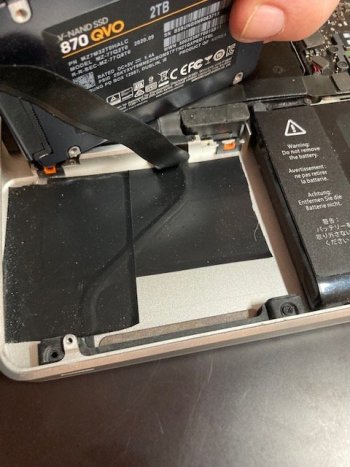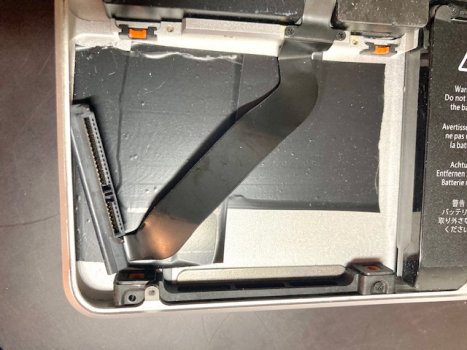I managed to get etrecheck working, it only took a few solid hours to get it to complete. This SSD is most certainly toast, but it also was extremely rarely used, and worked perfectly when it was purchased and tested. This strongly implies that the sata cable is destroying my harddrives and I need to replace both, right? I really hope I don't replace both the drive and the cable only for this to happen again.
EtreCheckPro version: 6.5.6 (6F041)
Report generated: 2022-01-22 01:38:10
Download EtreCheckPro from https://etrecheck.com
Runtime: 181:59
Performance: Poor
Problem: Computer is too slow
Major Issues:
Anything that appears on this list needs immediate attention.
Failing hard drive - This computer has a hard drive that appears to be failing.
Minor Issues:
These issues do not need immediate attention but they may indicate future problems or opportunities for improvement.
No Time Machine backup - Time Machine backup not found.
Apps crashing - There have been numerous app crashes.
Limited drive access - More information may be available with Full Drive Access.
Kernel extensions present - This computer has kernel extensions that may not work in the future.
Hardware Information:
MacBook Pro Model: MacBookPro9,2
2.50 GHz i5-3210M CPU: 2-core
4 GB RAM - Not upgradeable
Drives:
disk0 - TO Exter nal USB 3.0 240.06 GB
External USB 480 Mbit/s
disk0s1 - EFI (MS-DOS FAT32) [EFI] 210 MB
disk0s2 [APFS Container] 239.71 GB
disk1 [APFS Virtual drive] 239.71 GB (Shared by 5 volumes)
disk1s1 - M********** - Data (APFS) [APFS Virtual drive] (Shared - 51.54 GB used)
disk1s2 - Preboot (APFS) [APFS Preboot] (Shared - 28 MB used)
disk1s3 - Recovery (APFS) [Recovery] (Shared - 526 MB used)
disk1s4 - VM (APFS) [APFS VM] (Shared - 2.15 GB used)
disk1s5 - M********e (APFS) (Shared - 11.27 GB used)
Mounted Volumes:
disk1s1 - M********** - Data [APFS Virtual drive]
239.71 GB (Shared - 51.54 GB used, 174.58 GB available, 174.01 GB free)
APFS
Mount point: /System/Volumes/Data
Encrypting: 1% done
disk1s4 - VM [APFS VM]
239.71 GB (Shared - 2.15 GB used, 174.01 GB free)
APFS
Mount point: /private/var/vm
disk1s5 - M********e
239.71 GB (Shared - 11.27 GB used, 174.58 GB available, 174.01 GB free)
APFS
Mount point: /
Encrypting: 1% done
Read-only: Yes
System Software:
macOS Catalina 10.15.7 (19H2)
Time since boot: About 5 hours
Security:
Gatekeeper: App Store and identified developers
System Integrity Protection: Enabled
Antivirus software: Apple
Kernel Extensions:
/Library/Extensions
[Not Loaded] hp_io_enabler_compound.kext - com.hp.kext.io.enabler.compound (HP Inc., 3.4.0)
System Launch Daemons:
[Not Loaded] 35 Apple tasks
[Loaded] 218 Apple tasks
[Running] 83 Apple tasks
[Other] One Apple task
System Launch Agents:
[Not Loaded] 16 Apple tasks
[Loaded] 202 Apple tasks
[Running] 94 Apple tasks
[Other] One Apple task
Launch Daemons:
[Loaded] com.teamviewer.Helper.plist (TeamViewer GmbH - installed 2021-02-17)
[Not Loaded] com.teamviewer.teamviewer_service.plist (TeamViewer GmbH - installed 2021-03-16)
Launch Agents:
[Not Loaded] com.teamviewer.teamviewer.plist (TeamViewer GmbH - installed 2021-03-16)
[Not Loaded] com.teamviewer.teamviewer_desktop.plist (TeamViewer GmbH - installed 2021-03-16)
User Login Items:
[Not Loaded] TeamViewerMeetingLoginItem (TeamViewer GmbH - installed 2021-03-16)
Modern Login Item
/Applications/TeamViewer.app/Contents/Library/LoginItems/TeamViewerMeetingLoginItem.app
Backup:
Time Machine information not available without Full Drive Access.
Performance:
System Load: 1.33 (1 min ago) 1.26 (5 min ago) 1.25 (15 min ago)
Nominal I/O speed: 0.38 MB/s
File system: 123.27 seconds (timed out)
Write speed: 10 MB/s
Read speed: 14 MB/s
CPU Usage Snapshot:
Type Overall
System: 4 %
User: 6 %
Idle: 90 %
Top Processes Snapshot by CPU:
Process (count) CPU (
Source -
Location)
EtreCheckPro 7.50 % (Etresoft, Inc.)
system_profiler 5.00 % (Apple)
trustd (3) 3.72 % (Apple)
kernel_task 3.62 % (Apple)
WindowServer 3.40 % (Apple)
Top Processes Snapshot by Memory:
Process (count) RAM usage (
Source -
Location)
system_profiler 625 MB (Apple)
EtreCheckPro 522 MB (Etresoft, Inc.)
mdworker_shared (7) 167 MB (Apple)
ReportCrash 112 MB (Apple)
com.apple.WebKit.WebContent 77 MB (Apple)
Top Processes Snapshot by Network Use:
Process Input /
Output (
Source -
Location)
mDNSResponder 187 KB / 37 KB (Apple)
netbiosd 38 KB / 5 KB (Apple)
apsd 5 KB / 4 KB (Apple)
SystemUIServer 0 B / 64 B (Apple)
NotificationCenter 0 B / 0 B (Apple)
Top Processes Snapshot by Energy Use:
Process (count) Energy (0-100) (
Source -
Location)
WindowServer 2 (Apple)
system_profiler 0 (Apple)
mdworker_shared (7) 0 (Apple)
trustd (3) 0 (Apple)
ReportCrash 0 (Apple)
Virtual Memory Information:
Physical RAM: 4 GB
Free RAM: 63 MB
Used RAM: 3.04 GB
Cached files: 915 MB
Available RAM: 978 MB
Swap Used: 0 B
Diagnostics Information (past 7-30 days):
2022-01-21 22:34:41 mediaanalysisd - Crash (20 times)
Executable: /System/Library/PrivateFrameworks/VideoProcessing.framework/Versions/A/mediaanalysisd
Details:
dyld: launch, loading dependent libraries
2022-01-21 21:11:16 photoanalysisd - Crash (20 times)
Executable: /System/Library/PrivateFrameworks/PhotoAnalysis.framework/Versions/A/Support/photoanalysisd
Details:
dyld: launch, loading dependent libraries
2022-01-21 21:11:16 callservicesd - Crash (20 times)
Executable: /System/Library/PrivateFrameworks/TelephonyUtilities.framework/callservicesd
Details:
dyld: launch, loading dependent libraries
2022-01-21 21:06:29 photolibraryd - Crash (20 times)
Executable: /System/Library/PrivateFrameworks/PhotoLibraryServices.framework/Versions/A/Support/photolibraryd
Details:
dyld: launch, loading dependent libraries
2022-01-21 20:58:48 replayd - Crash (20 times)
Executable: /usr/libexec/replayd
Details:
dyld: launch, loading dependent libraries
2022-01-21 20:18:30 sharingd - Crash (19 times)
Executable: /usr/libexec/sharingd
Details:
dyld: launch, loading dependent libraries
2022-01-21 20:16:03 CommCenter - Crash (21 times)
Executable: /System/Library/Frameworks/CoreTelephony.framework/Support/CommCenter
Details:
dyld: launch, loading dependent libraries
2022-01-21 20:05:24 mds_stores - Crash (20 times)
Executable: /System/Library/Frameworks/CoreServices.framework/Versions/A/Frameworks/Metadata.framework/Versions/A/Support/mds_stores
Details:
dyld3 mode
[0x70000dcfd000] Failed to get kMDStoreAccumulatedCounts
[0x70000dcfd000] Failed to get kMDStoreAccumulatedSizes
[0x70000daf1000] Failed to get kMDStoreAccumulatedCounts
[0x70000daf1000] Failed to get kMDStoreAccumulatedSizes
[0x70000d9eb000] open meta info error 9
[0x70000d9eb000] reverseStoreUpdateState err:-1
[0x70000d9eb000] update state (1) failed err:-1 at 4253
[0x70000d9eb000] Copy file failed for reverseDirectoryStore.shadow
[0x70000d9eb000] error (2) opening reverseDirectoryStore.shadow
2022-01-21 19:58:27 CoreSpotlightService - Crash (20 times)
Executable: /System/Library/Frameworks/CoreSpotlight.framework/CoreSpotlightService
Details:
dyld: launch, loading dependent libraries
2022-01-21 19:56:39 corespotlightd - Crash (21 times)
Executable: /System/Library/Frameworks/CoreServices.framework/Versions/A/Frameworks/Metadata.framework/Versions/A/Support/corespotlightd
Details:
dyld: launch, loading dependent libraries
2022-01-21 18:49:26 SafariBookmarksSyncAgent - Crash (16 times)
Executable: /Library/Apple/*/SafariSupport.bundle/Contents/MacOS/SafariBookmarksSyncAgent
Details:
dyld: launch, loading dependent libraries
/Library/Apple/System/Library/StagedFrameworks/Safari/SafariSharedUI.f
ramework/Versions/A/SafariSharedUI
2022-01-21 16:09:27 Safari.app - Crash (2 times)
Executable: /Applications/Safari.app
Details:
dyld: launch, loading dependent libraries
/Library/Apple/System/Library/StagedFrameworks/Safari/SafariSharedUI.f
ramework/Versions/A/SafariSharedUI
2022-01-20 20:40:18 kextd - Crash
Executable: /usr/libexec/kextd
Details:
dyld3 mode
kernel kext load request: id com.apple.driver.AppleVirtIO
2022-01-20 15:39:59 accountsd - Crash
Executable: /System/Library/Frameworks/Accounts.framework/Versions/A/Support/accountsd
Details:
dyld: in dlopen()
/Library/Apple/System/Library/StagedFrameworks/Safari/WebKit.framework
/Versions/A/WebKit
2022-01-20 15:39:54 com.apple.CloudPhotosConfiguration - Crash
Executable: /System/Library/PrivateFrameworks/CloudPhotoServices.framework/Versions/A/XPCServices/com.apple.CloudPhotosConfiguration.xpc/Contents/MacOS/com.apple.CloudPhotosConfiguration
Details:
dyld: launch, loading dependent libraries
2022-01-20 15:39:53 WindowServer - Crash
Executable: /System/Library/PrivateFrameworks/SkyLight.framework/Versions/A/Resources/WindowServer
Details:
StartTime:2022-01-20 15:39:04
GPU:IG
MetalDevice for accelerator(0x4b33): 0x7fd3927121c8 (MTLDevice: 0x7fd3
94316000)
IOService:/AppleACPIPlatformExpert/PCI0@0/AppleACPIPCI/IGPU@2/AppleInt
elFramebuffer@0
End of report


